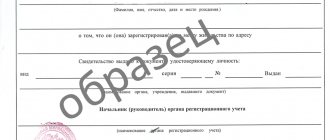Permanent or temporary registration at a specific address in a city or rural locality allows a Russian citizen to have the following advantages over unregistered persons:
- Use free services of medical institutions and educational institutions for children.
- Receive benefits and benefits.
- It is much easier and faster to find a job.
- Receive services from government bodies, which include the Civil Registry Office.
In this regard, the opportunity to use government services not in the territory of residence, in particular, to obtain a divorce not based on registration, is fraught with difficulties, and in some cases is completely unacceptable. Russian law authorizes two government bodies to deal with divorce cases: the registry office and the court. The nuances of dissolving a marital relationship other than the official place of residence in each of these authorities will be described in detail below.
Features of divorce outside the place of registration
Through the registry office
The divorce process consists of a clear sequence of actions, which is enshrined in law. Every citizen who wants to end unpleasant family relationships with his wife or husband and gain freedom from fulfilling marital obligations must go through it. Knowing how to properly get a divorce at a state registry office other than your place of registration will help you save time, effort and money spent on traveling and collecting documents.
So, in brief, the divorce algorithm is as follows:
- Cases are clarified when a marriage union concluded between spouses can be terminated through the state registry office and what documents are needed for this.
- The registry office authorities that have the legal right to divorce spouses are determined.
- The necessary documents are prepared and methods for submitting them are figured out.
- The documents are submitted and the day on which the marriage will be terminated is determined.
- The divorce is registered at the registry office, and former marriage partners receive divorce certificates.
If the marriage partners agree to amicably separate and, at the same time, they do not have at least one minor child in common, then they can submit documents for the termination of the marriage through the state registry office.
In which state registry office can the end of a marital relationship be formalized? The law distinguishes 2 categories of these bodies:
- Located in a locality in which both or one of the marriage partners are registered.
- Located in the locality where the official marriage took place and family relationships were registered.
This means that a divorce outside your own place of residence is allowed only when:
- The spouses are registered in different cities;
- Both spouses are registered in the same city, but the family union was not registered at the place of residence of the initiator of the divorce.
It should be noted that neither the presence of temporary registration in the city, nor, moreover, the actual residence in it, does not give the right to demand a divorce in the civil registry office of a given city.
The list of required documents in case of mutual divorce is uniform and unchanged and includes:
- A receipt proving payment of the duty.
- Both spousal passports.
- An application drawn up in the prescribed form.
- Marriage certificate.
The law allows three ways to transfer the necessary documents:
- Using the capabilities of the State Services website. The most optimal way to send papers over long distances, which is available anywhere there is Internet access. You can also pay the state fee there on the website. One of the disadvantages of this method is the need to purchase an enhanced electronic signature for each spouse, without which it is impossible to send a package of collected digital documents.
- MFC. Thanks to it, you can send divorce documents, for example, from Yekaterinburg to Volgograd, without coming to the Volgograd registry office. The application with attachments is submitted to the MFC employee in the presence of both marriage partners or one of them, but then the signature of the absent spouse must be notarized. In addition, it is unacceptable to involve a representative in submitting documents. In other words, divorce documents can only be submitted in person.
- Bring the documents in person to the registry office of another city. The rules for filing are absolutely identical to the rules for filing papers using the MFC, i.e. the personal presence of the spouses or one of them is required, a ban on representatives is established, and notarization of the signature of the absent marriage partner is required.
On the day determined by the civil registry office employee or the spouses (at least one month after the divorce documents are served), the termination of the marriage is formalized.
In the personal presence of one spouse or both of them, the civil registry office employee makes sure that the decision of the husband and wife regarding the now inevitable separation is unshakable, enters the necessary information about the divorce into a special book and presents the now ex-spouses with a certificate of termination of the marriage.
The differences between a divorce initiated at the sole request of a spouse and a mutual dissolution of marriage are indicated in the table.
| Differences | A comment |
| Grounds for official termination of marriage |
The above circumstances must be confirmed by relevant judicial acts (sentence or decision). |
| Submission methods | There is only one way possible - a personal visit to the state registry office. |
| Documentation |
|
Otherwise the procedures are identical.
Through the court
Possible places to file a claim:
At the permanent registration address or at the temporary registration address, or even at the actual residence address of the defendant. If the applicant does not know exactly where the defendant is located, several addresses can be indicated in the statement of claim to which subpoenas will be sent.- At the permanent registration address of the plaintiff, when medical documents confirm that he is seriously ill, as well as if he has a dependent minor.
- In any Russian court by agreement between the spouses.
From this we can conclude that in the case of termination of marriage through the court, the law allows for a wider variety of possible places for divorce.
Next, the applicant must determine which court (magistrate or district) can resolve his case. To do this, it is necessary to have an idea of the competence of each court.
| Name | Competence of the court |
| Magistrate's Court | The simplest divorce claims without disagreements regarding small children and division of property for large sums. |
| District Court | Divorces where there are any disputes regarding children, and (or) marital property is divided at an estimated value of more than 50,000 rubles. |
There are two ways to submit documents for consideration by a judge:
- Via the Internet using the State Automated System “Justice”. To access the service, you must have an account on State Services and confirm your account. Information on how to verify your account can be found here.
- Submit in person through the civil office or through the court reception.
Judges usually send extracts from court decisions on divorce to the state registry office indicated on the marriage certificate. In other words, to the registry office that registered the family relationships of marriage partners. To avoid this, it is necessary to submit a petition at the meeting and ask the court, if a positive decision on divorce is made, to send an extract to the state civil registry office at the place of official registration of the petitioner.
The marital union will be dissolved after the relevant court decision acquires the force of law. An extract from it is sent to former marital partners by mail, if they have submitted a request for this, or is collected through the court office in person.
Next, the former spouse must pick up a certificate of termination of marriage from the state civil registry office that registered the dissolved marital union or is located at the place of residence of one of the spouses.
Documents that need to be provided for this procedure include:
- Application in the prescribed form.
- State duty check.
- Marriage certificate.
- Applicant's passport.
- Court transcript.
Documents are sent digitally through the State Services website, brought in person or by a representative holding a notarized power of attorney. It is not necessary to submit a joint application, so each former spouse has the right to prepare their own copy of the documents.
Once the documents have been verified and their validity has been established, the civil registry officer will produce a copy of the divorce certificate and give it to the applicant. All this usually happens on the day the application is submitted.
What does electronic mean?
On the State Services portal it is possible to obtain three types of divorce registration services:
- Registration of divorce by mutual consent means that you are dissolving your marriage through the civil registry office in the Russian Federation.
- Registration of divorce based on a court decision with one applicant - to receive this service, you must already have in your hands a court decision to dissolve your marriage unilaterally.
- Registration of divorce based on a court decision with two applicants - to receive this service, you must already have a court decision on the divorce of your marriage.
The service of registering divorce is not the process of divorce itself, but a record in the registry office that your marriage has been dissolved. That is, if you have family or property disputes that require third-party intervention, you will have to first file a lawsuit in court. This service helps to save time when filing applications, avoid unnecessary trips to government agencies and reduce the cost of the divorce fee (payment of the fee through the government services portal is at a 30% discount).
The concept of “divorce on the Internet” is suitable for the first service – registration of divorce by mutual consent. By using this electronic service, you do not have to meet with your spouse during the divorce process. You will only need to visit the registry office to obtain a divorce certificate.
Basic principles of property division
If the parties to the marriage did not draw up a marriage contract, then the marital property is divided based on the provisions of a notarial agreement on property or on the basis of a court decision.
The legal features of the agreement (a sample can be viewed here) include:
A ban on the inclusion in its text of personal belongings (clothing, cosmetics, shoes, donated, premarital or inherited property) of spouses. In other words, by agreement it is allowed to divide only common property acquired jointly and in a marital relationship.- The shares are determined arbitrarily by the spouses, according to an agreement reached between them.
- The document is certified by a notary.
- Debts are divided by agreement and not necessarily equally.
If there is no agreement, then the court comes into play and uses the following rules when dividing:
- Joint property is subject to division. It refers to movable and immovable things acquired during marriage, labor and other income, royalties for intellectual works, shares in organizations, shares, bills and other securities, bank deposits, benefits, pension payments.
- Each spouse's share is 50%. The share of one of the participants in the marriage can be reduced if he did not invest effort and resources in providing for the family, squandered property, or suffered from alcoholism. If the shares are not equal, then the spouse with the larger share gives the difference in money or property to the other partner.
- Debts are divided according to the awarded shares.
- Assets acquired during a marriage by one of the spouses, but during the separation of the partners, when they did not maintain a common household, cannot be divided and are considered the personal property of the spouse.
If the participants in a family relationship decide to simplify a possible divorce for themselves and draw up a marriage contract, then the assets described in it are divided according to its terms. The subject of this agreement can be any property that belongs to a party to the contract. This means that, according to the contract, the husband has the right to give his wife in the event of a divorce, for example, the apartment he inherited.
The only important thing is that the contract does not infringe on the property rights of one of the parties to the marriage. Infringement means, for example, the absolute deprivation of any party of the right to receive property acquired in official relations or unfavorable conditions that must be fulfilled in favor of the other party.
The contract is signed in the presence of a notary and certified by him. It can be concluded both in the premarital period and after the official marriage until the day of divorce. A sample for reference is available at this link.
The possibility of such a divorce
In fact, an official long-distance separation is a fairly simple procedure. It is practiced by many couples for the above and other reasons. The law allows for a divorce to be carried out without the presence of one of the partners, if there are no controversial issues.
There may be several controversial situations:
- Property division.
- Who will the child/children stay with?
- How and in what amount will alimony be paid?
In this case, alimony can be not only for children, but also for an incapacitated spouse. The most common case is when a mother is on maternity leave for a child under 1.5 years of age. In principle, the issue of maintaining both mother and children is also decided from afar. It is possible to file for alimony at the same time as filing for divorce.
Note! Controversial issues with the payment of alimony in a fixed amount or during the division of property can complicate the process. This also applies to disputes about who the child will stay with.
In general, divorce from afar is possible with the exception of a few cases. Many people do not know about this or worry that it is very difficult and will require excessive effort. People are also frightened by the unknown of the official divorce procedure at a distance.
List of documents for filing a claim
Below is a list of documents that can be filed with the court in cases where spouses not only get divorced, but also try to resolve disputes regarding alimony, marital property and the place of residence of children.
- A statement describing the claims. Sample samples can be viewed here or here, as well as here.
- Marriage contract.
- Information confirming the defendant’s level of earnings (certificate from the employer, witness statements). It will be required if the plaintiff wants to receive alimony payments from the other side.
- Property division agreement.
- Documents for children (birth certificates).
- Marriage certificate.
- Inventory of property assets belonging to spouses and subject to division.
- Documents for housing (lease agreement, certificate of ownership). They are necessary if the spouse wants to keep the child with him after the divorce.
- Appraiser's report.
- Evidence of the impossibility of further life together with the defendant due to his infidelity, alcoholism, beatings, etc. This may be testimony; certificates from medical organizations or police; administrative protocols; criminal record certificates; information from correspondence via email, instant messengers or social networks.
- Characteristics of the applicant provided by relatives, colleagues, child’s teachers, employer.
Reasons for needing a long-distance divorce
There are a huge number of reasons for the breakup itself, although we are not always talking about breaking up a long-distance relationship. Many people are familiar with the situation when one of the couple leaves after a quarrel with the wording “I’ll stay with my mother.” There may be variations with dad, friends, in a rented apartment, and so on. The bottom line is that these people can live far away. As a result, a situation may arise when it is necessary to file for divorce in another city. But this is not the only reason for the end of a long-distance relationship. There are different situations:
- Having health problems.
- Desire to register a new marriage.
- Reluctance to come to the city of registration.
- Inability to leave work for a long period of time.
- High cost of train and other tickets.
- A banal lack of time to travel for various reasons.
- Inability to leave a child or loved one behind during departure.
Some of these reasons are really important, sometimes even insurmountable. Others are not so significant, but play a role in making the decision to divorce from afar. Then the question arises - can I file for divorce in another city?
State duty amount
The fee must be paid before the documents are submitted to the competent government authority. If this is not done, they will be returned to the person who submitted them for consideration.
The fees the Civil Registry Office charges for divorces are as follows:
- Each spouse pays 650 rubles. in case of mutual termination of marriage.
- The applicant pays 350 rubles. in case of a unilateral declaration of termination of marriage.
The fees payable for the proceedings of a divorce case are as follows:
- The plaintiff pays 600 rubles. for the judge's permission to terminate the marital relationship with the defendant.
- The defendant pays 150 rubles if he is forced to pay alimony in favor of a minor child.
Where to apply
The divorce procedure is carried out by two authorities:
- MARRIAGE REGISTRY;
- Judicial authority.
This does not mean that you need to contact both authorities at once.
To submit an application, one of them is selected, depending on the circumstances of the divorce:
- if there are no children and there are disagreements regarding the termination of the marriage, you should contact the registry office;
- if there are children, one of the spouses objects to the divorce, division of property or a decision on child custody after divorce is necessary - to the court.
When submitting an application, you can choose not every registry office. Spouses have the right to apply:
- to the department where the marriage was registered
- Civil registry office at the place of registration of the wife;
- Civil registry office at the husband's place of registration.
Note! Applications from both parties are accepted only simultaneously, excluding the circumstances listed in Part 2 of Art. 19 RF IC.
Thus, having collected the necessary documents, you can contact the registry office where the marriage was registered, or the nearest one to the place of registration of one of the members of the couple.
The divorce procedure comes down to a general algorithm:
- payment of state duty;
- filing an application;
- waiting for a decision;
- obtaining a certificate.
Thus, an application to the registry office can be submitted both at the place of registration of the applicant, and at the place of registration of the second spouse or at the place of registration.
Arbitrage practice
Previously, in the cases described below, plaintiffs faced serious difficulties in determining the court in which to bring their written demands. However, at present, thanks to the activities of the Supreme Court of Russia, dedicated to the systematization and interpretation of court practice, these problems have been resolved.
So:
- If the second spouse is in prison, and the sentence assigned to him is less than 3 years, then the application must be submitted to the court located at the prisoner’s place of registration, but not at the location of the colony.
- If a participant in the marriage is in an unknown place, but is not recognized by a court decision as missing, then the applicant has the opportunity to choose one of two options: Submit the claim to the court that serves the residence address of the missing defendant. This address must be the last known address for the plaintiff.
- Submit the claim to the court located at the location of the defendant’s property assets.
Under what conditions can you file for divorce online?
Registration of divorce by mutual consent through the State Services portal is only possible if you plan to get a divorce through the civil registry office in the Russian Federation.
That is, citizens of the Russian Federation can submit an application for divorce online if:
- you have no minor children;
- both spouses agree to divorce;
- there are no disputes regarding the division of property;
- your spouse has gone missing*;
- your spouse has been declared legally incompetent*;
- your spouse has been sentenced to more than 3 years*.
* If your case fits one of the last three points, then you can divorce without the consent of your spouse, regardless of whether you have joint minor children.
! IMPORTANT Even if during the divorce the spouses agreed on all controversial issues, the presence of children under 18 years of age is a condition under which a divorce through the registry office is not possible, and you will have to file a claim in court. That is, if you have children, you cannot apply for divorce through State Services!
If you have minor children, there are property disputes, one of the spouses does not agree to a divorce, or a division of common business and debts is required, a divorce through the registry office is not possible. Refusal by one of the spouses or failure to comply with the established procedure for termination is equivalent to the presence of disputes. In this case, the initiator of the divorce must go to court to make a decision.
The legislative framework
| Normative act | Articles |
| Civil Procedure Code | Article 23 – marriages dissolved by a magistrate. Article 29 – situations when the plaintiff chooses a court to file a divorce claim. Article 32 establishes the possibility for spouses to agree on a specific court to which they will transfer the materials of the divorce claim. Article 132 – additional documents submitted to the judge. |
| Family code | Article 17 determines in which cases a husband cannot divorce his wife. Article 34 is a detailed list of the common property of the participants in the marriage. Article 36 is a detailed list of personal property of the participants in the marriage. Article 39 establishes how spousal shares in property are determined. Article 42 determines what can be regulated by a marriage contract and what cannot be regulated. Article 160 – nuances that are important when terminating a marriage with a citizen of a foreign state. |
| Tax Code (Part 2) | Article 333.26 - the amount of money transferred for the services of the registry office to the state treasury. Article 333.19 – the amount of money transferred for court services to the state treasury. |
| Federal Law “On Acts of Civil Status” | Chapter 4 – description of the procedure for ending marital relations in the civil registry office. |
Documentation
Is it possible to get a divorce without registration? Regardless of the presence/absence of registration, a citizen must provide the following package of documentation:
- civil passport of the initiator;
- marriage document;
- personal documents of minor children;
- agreement on division of property or documents on property for division;
- certificate of family composition;
- an agreement on the payment of financial support for children or documents on income for ordering payment in court;
- receipt of payment of duty.
The legislator has significantly limited the list of organizations to which a citizen can apply to file an application for divorce. Minimal difficulties arise for spouses who have made a joint decision to divorce. For other persons, the process of dissolution of the union will involve mailing documents or paying a representative.
At the same time, the law exempts a citizen from mandatory personal presence during a divorce. The spouse may submit a request to consider the claim in his absence. When sending an application to the registry office remotely, notarization of documents is required.









